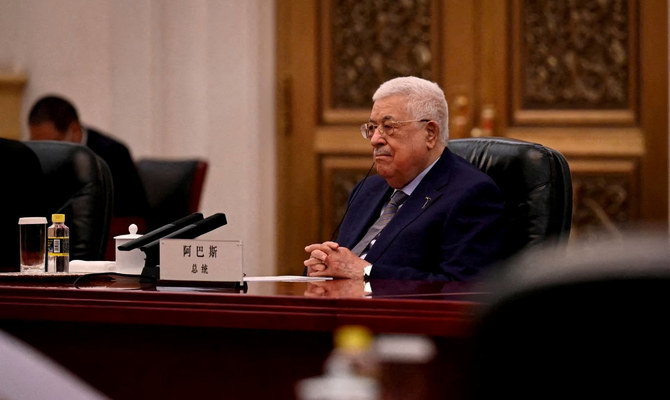GAZA CITY: The popularity of the Palestinian Authority in the West Bank has fallen sharply, while support for Hamas and Islamic Jihad has grown, according to an Israeli study.
The report, carried out by the Institute for National Security Studies at the Israeli Tel Aviv University, urged the Israeli government to strengthen the PA’s security services and boost its economy, describing it as being in the “Israeli interest.”
The research team comprised a retired major general and two academics from the University of Wales in the UK.
Mukhaimer Abu Sa’adaa, a professor of political science at Al-Azhar University in Gaza, said there was ambiguity in Israel’s policy toward Hamas in Gaza and the PA in the West Bank.
“The current Israeli government or its predecessor has no interest in changing the existing reality between the West Bank and the Gaza Strip, and keeping the division is a clear Israeli goal, which Prime Minister Benjamin Netanyahu spoke about explicitly,” he told Arab News.
The study said the lack of prospects for a political solution to the Palestinian-Israeli conflict and presence of a right-wing Israeli government were the key reasons for the falling popularity of the PA under President Mahmoud Abbas.
“Despite the hopes of many, almost three decades after the establishment of the PA and after a series of failed negotiations and policy initiatives, the Israeli-Palestinian political process has reached an impasse,” it said.
The study looked at the causes of the PA’s weakness and the rise of Hamas’ popularity in light of the absence of a clear strategy from Israeli governments on dealing with the Palestinian Authority.
“It seems that the PA — under the leadership of Abu Mazen (Abbas) — is in the most severe situation since the days of the second intifada and on a path of ongoing decline that may end in its collapse,” the study said.
The PA is facing multiple challenges, the most prominent of which are the economic crisis and falling revenues, which have led to the weakening of its security grip in some parts of the West Bank.
In recent months, the authority has been able to pay government employees only partial salaries, which has caused unrest and led to teachers and doctors going on strike more than once.
Israel stepped up its military offensives in the north of the West Bank at the beginning of last year, causing hundreds of deaths and injuries. The incursions into Palestinian cities further weakened the capabilities of the Palestinian Authority.
“The legitimacy of the PA under the leadership of Abu Mazen is at a low point in Palestinian public opinion,” the study said.
It added that the PA and its security apparatus “do not control parts of the territory under their responsibility, as local organizations — alongside the known terrorist organizations — manage to expand their ranks and terrorist infrastructures for the purpose of launching terrorist attacks” against Israeli security forces and Israeli civilians in the West Bank and in Israel.
The president’s “continued resistance to terrorism and support for security cooperation is seen as irrelevant, not serving or promoting the Palestinian interest and therefore illegitimate,” it said.
A separate poll conducted last month by the Palestinian Center for Policy and Survey Research showed that 63 percent of Palestinians believe the PA is a burden on them, while 80 percent were dissatisfied with Abbas’ performance.
It found that 50 percent of Palestinians thought the PA’s dissolution would be in the best interests of the Palestinian public, while 63 percent thought its survival was in Israel’s interest.
A total of 71 percent said they supported the establishment of groups such as Lion’s Den that are not under the control of the PA, while 80 percent opposed the PA’s call for them to be disarmed.
The INSS study said that Israel and the Palestinian leadership “do not see eye to eye on the meaning of a strong PA.”
“While the Israeli emphasis is on the functioning of the PA and its adherence to a political process based on direct negotiations with Israel, the Palestinian leadership seeks a strong PA not only for the purposes of improved performance but for the purpose of tightening political and civil control under conditions of lack of legitimacy,” it said.
“Hamas’ political strength does not rest only on its ideology, nor only on the negative sentiment toward the PA. The source of Hamas’ strength is its military capabilities, its full control of the Gaza Strip thanks to its military power, and its cooperation infrastructure with Iran and Hezbollah, which allows it to advance its military buildup in the West Bank, launch and operate the terrorist infrastructures, undermine the security reality and undermine the stature of the PA.”


























